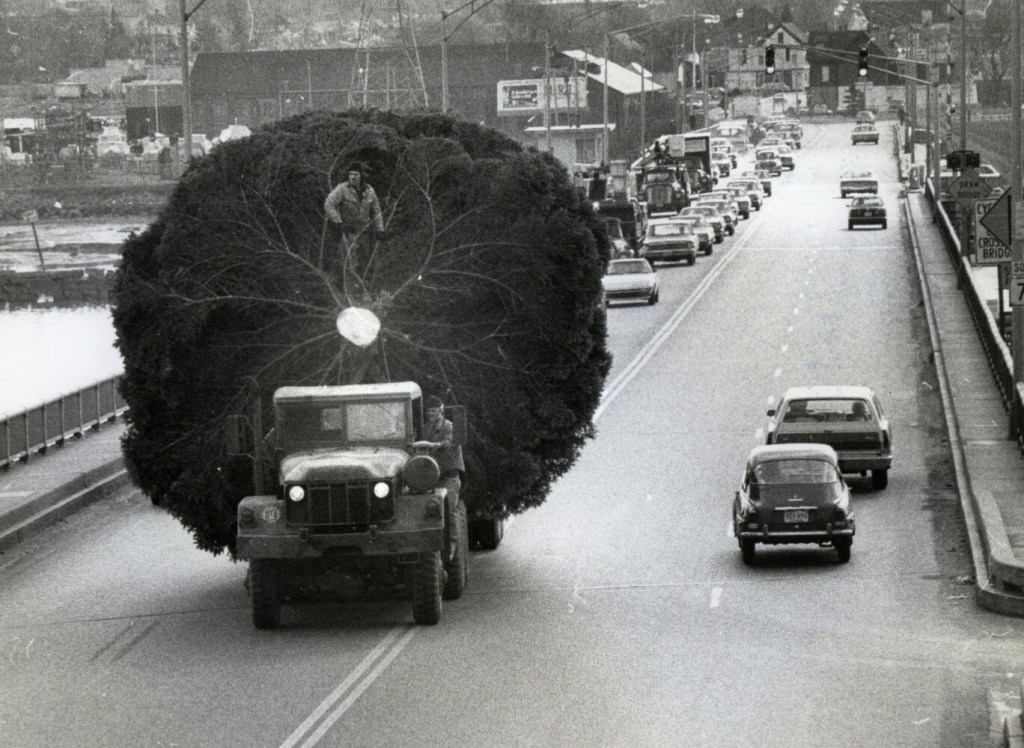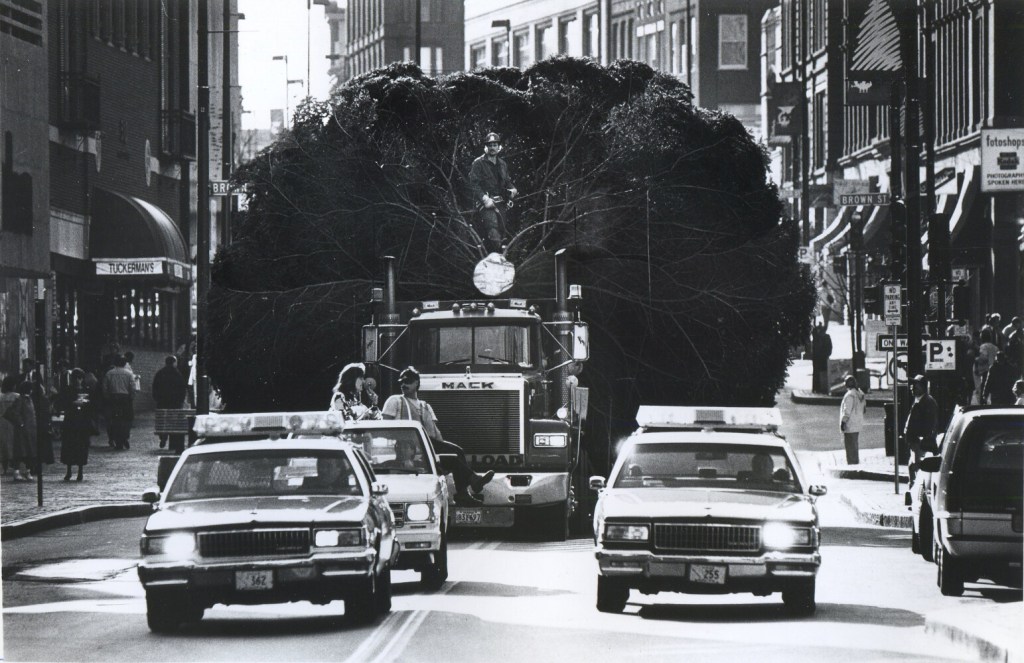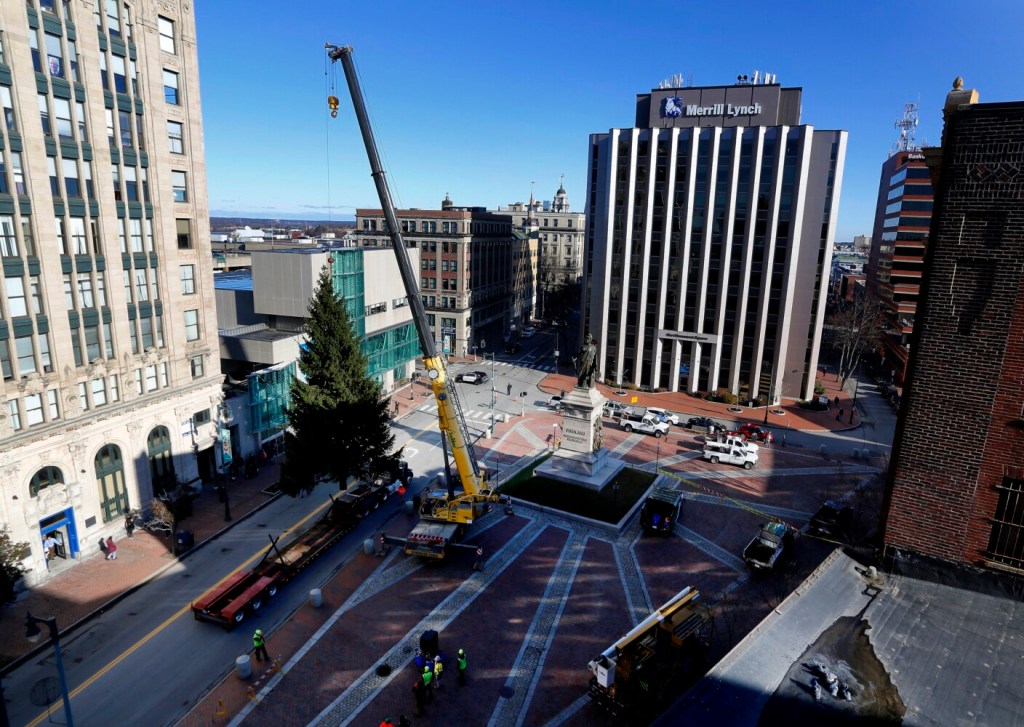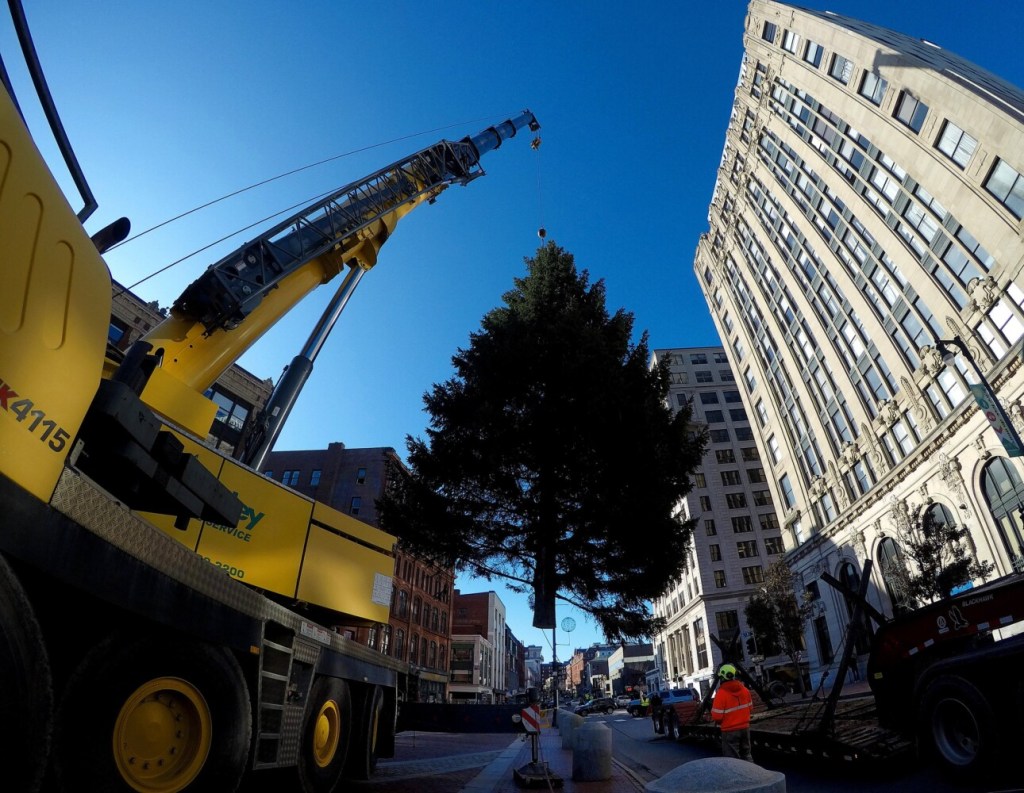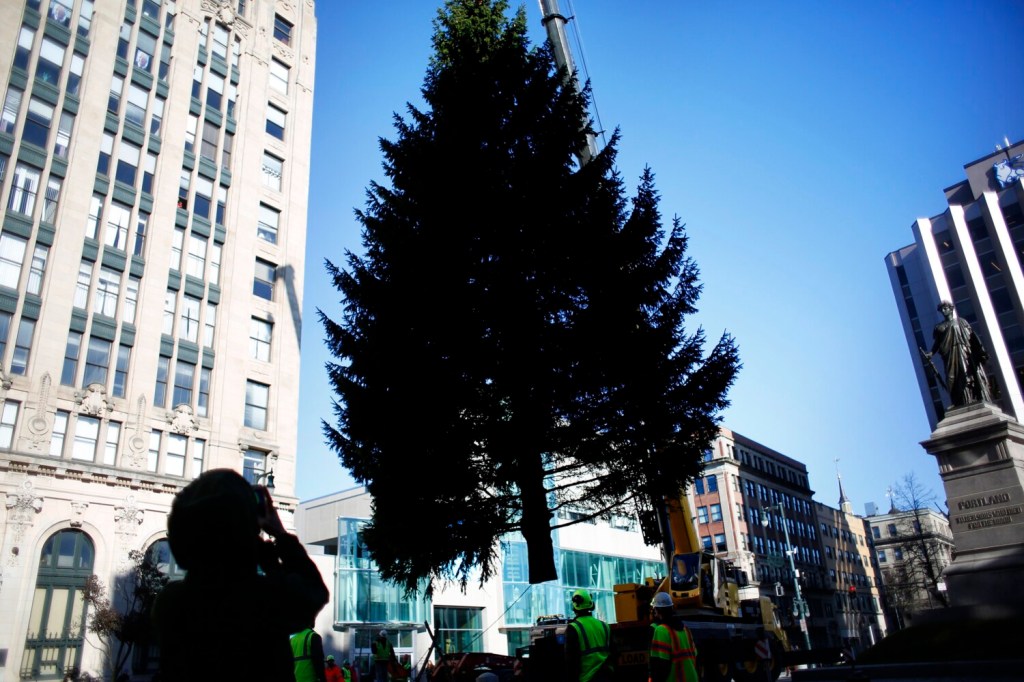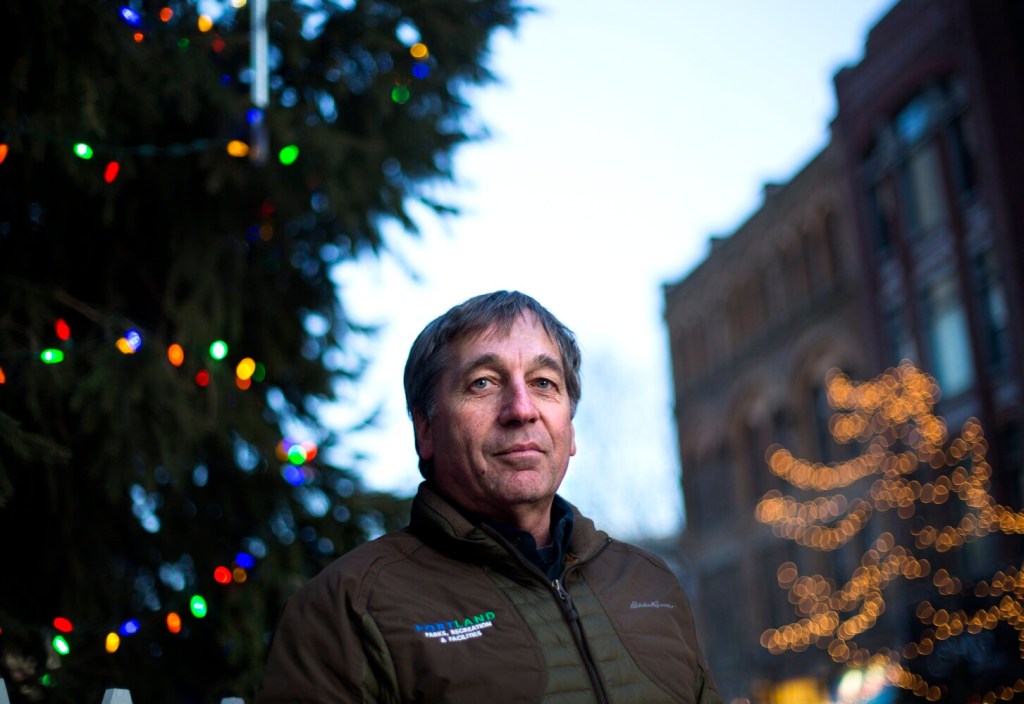The year was 1989. George H.W. Bush was president. Nintendo had just released the Gameboy. And pop culture was dominated by folks who would fall from grace years later, with “The Cosby Show” and “Roseanne” dominating network television and Bobby Brown near the top of the charts with “My Prerogative.”
In Portland, a 34-year-old arborist in his first year on the job was driving stakes into the ground marking the locations for over 100 trees – Austrian pine, Norway spruce, oak and arborvitae, among others – being planted along a mile-and-a-half stretch along the interstate from Deering Avenue to Tukey’s Bridge.
Over the next 30 years, those trees would inch higher and higher into the sky, providing shade and respite for scores of baseball players, horseshoe throwers and tennis players from the sun and traffic rushing by on the nearby Interstate 295 – whether it was a newly remodeled Buick Riviera from 1989 or a quieter, more environmentally friendly Prius hybrid of today.

City Arborist Jeff Tarling stands before this year’s holiday tree at Monument Square. Staff photo by Derek Davis Buy this Photo
But one of those trees, a Norway spruce planted near the baseball field, a tree that seemed unremarkable at the time, was destined to become famous, at least locally.
On Nov. 21, city crews felled the 54-foot-tall, 5,000-pound conifer and transported it to Monument Square, where it will spend its final days spreading holiday cheer as the city’s official tree. Then it will be reduced to mulch for the city’s flower beds.
City Arborist Jeff Tarling could not have known that the 8-foot-tall Norway spruce he had planted next to the baseball field in Deering Oaks would eventually grow up to become the symbol of Portland’s holiday celebration.
“I don’t think I ever thought we’d put a tree up in Monument Square that I had planted. It’s kind of a product of longevity,” said Tarling, who was recently honored for 30 years of service in Portland. “You look at how quickly time goes by, but also how remarkable trees are.”
It’s unclear when Portland first began displaying a Christmas tree in Monument Square, but the tradition in the U.S. dates back to the early 20th century. An old photo, purportedly from 1939 or earlier, posted to the “Portland Maine History 1786 to Present” Facebook group, appears to show four lit trees surrounding the Our Lady of Victories statue when Monument Square was a traffic circle. The square wouldn’t be reconfigured and expanded until the 1970s.
Tarling said ideal growing conditions – an open space, good soil and plenty of moisture – helped the spruce grow at a rate of about a foot or more a year and allowed it to form into a near perfect conical shape with branches from top to bottom.
As the tree grew, so too did Maine’s largest city, which went from a hardscrabble port town to well-known tourist destination for foodies and craft beer enthusiasts. It also kept silent watch over activities in Deering Oaks, which is home to trees over a century old. The 55-acre open space, bounded by State Street, Park Avenue, Deering Avenue and I-295, hosts a popular farmers market in the summer and a pond that is used as an ice-skating rink in the winter.

The 40-foot Norway spruce tree is installed at Monument Square on Nov. 21. Staff photo by Derek Davis
Anne Pringle, president of the Friends of Deering Oaks, said the park was nominated for the National Register of Historic Places the same year the spruce was planted.
Over the next few years, the friends group would form to help care for the park and in 2002, Pandora LaCasse’s holiday lighting display was added. In 2006, the small park castle was restored and turned into a cafe. And just last year, the park hosted a rare black hawk, a native of Central and South America, for two months before the bird succumbed to frostbite.
Selecting, cutting and transporting a 40- to 60-foot tree into downtown Portland is an enormous task. So is securing and decorating it with over 5,000 LED lights, which can take three days and crews on two bucket trucks to accomplish.
“It’s not like throwing it on top of your car or stuffing it in the back of your station wagon,” Tarling joked.
But the 14-member crew of city foresters and private-sector volunteer truck drivers and crane operators have a way of making it look easy. And things usually go off without a hitch.

Jim Hodgdon of the Portland Forestry Department rides down Congress Street aboard the 55-foot Christmas tree bound for Monument Square in 1991. Staff photo by Doug Jones
But that hasn’t always been the case.
In November 1983, a 60-foot-tall tree placed and decorated in Monument Square was toppled by a 40-mph wind gust during a heavy downpour only hours before the lights were scheduled to be lit.
Workers apparently had shaved the tree base so it could fit into an underground stand, which weakened it. Nobody was injured. The tree was replaced within days with one of similar size that was cut down on Capisic Street. And the city drilled a deeper, 24-inch, concrete sleeve to hold it.
The city now uses four guy wires attached to nearby buildings to secure the tree.
Tree troubles continued the following year, only this mishap occurred during harvesting.
Crews were attempting to remove a 55-foot-tall tree next to a home in South Portland in 1984 when the crane cable snapped, sending the blue spruce crashing to the ground. The tree was fatally damaged, so crews sliced it up and trucked it offsite, so it could be reduced to mulch. The tree ripped the utilities from the house and destroyed a window sill. But again, the tree was replaced within days and no one was injured.
In 1997, a tree removed from Baxter Boulevard was so large – 65 feet tall and 30 feet wide – that it barely fit down Congress Street. Tarling, who keeps a scrapbook of the trees he’s helped select, 27 of which have been blue spruce, shared a photo of a police officer standing next to a man accusing crews of scraping the side of his white Toyota Tacoma with the massive conifer.
“It turned out the scrape was only mud,” Tarling said.
The hunt for this year’s tree began like every other.
The city of Portland and Portland Downtown, a downtown improvement district, put out a call for a tree in October. Tarling said the search is typically limited to Greater Portland, because of transportation issues.
As in years past, about dozen people responded with offers for the city to remove trees from their yards because they had overgrown the space or otherwise become a nuisance.
Tarling and another worker made the rounds to evaluate the nominations. First to Pine Point in Scarborough, then to Gorham, Stroudwater and other Portland neighborhoods, and eventually Falmouth. But none of the the candidates met the city’s requirements of being easily accessible and relatively attractive.
After all, Tarling is well aware of the public ridicule that can accompany a scrawny tree, especially when it’s displayed in the middle of Maine’s largest city.

Portland’s holiday tree was planted 30 years ago during City Arborist Jeff Tarling’s first year on the job. Staff photo by Derek Davis Buy this Photo
“It’s not like going to a tree farm and cutting the perfect tree,” Tarling said. “They’re growing in nature and they have their nuances.”
After evaluating the nominations, Tarling said his mind kept returning to that massive Norway spruce he had planted many years ago.
The tree had grown to tower over the baseball field and tennis courts, and was known as a safe haven for some of the city’s homeless. It also had become a hideout for drug use, according to the city’s parks commission.
Over the summer, crews had determined that the tree had overgrown its current location and would have to either be pruned or removed anyway.
“It didn’t seem right to prune it up and make it into a palm tree,” Tarling said.
Instead, it was chosen to be “the tree that signals the start of the holiday season,” the city said in a news release.
Today, the festive tree keeps quiet watch over Monument Square and adds a little light during these short, dark days of December. Revelers admire the 5,000-plus LED lights, including new, cascading snowfall lights, as they climb aboard carriages for a horse-drawn ride through town.
Tarling said his favorite part of the job this time of year is watching the faces of children light up when they see the tree. It takes him back to when he was a kid, planting trees in the yard of his family’s South Portland home and looking forward to his own trip across the bridge to see Portland’s prized tree.
“You look over and say, ‘This is why we’re doing it,'” Tarling said. “It’s a tradition.”
Send questions/comments to the editors.




